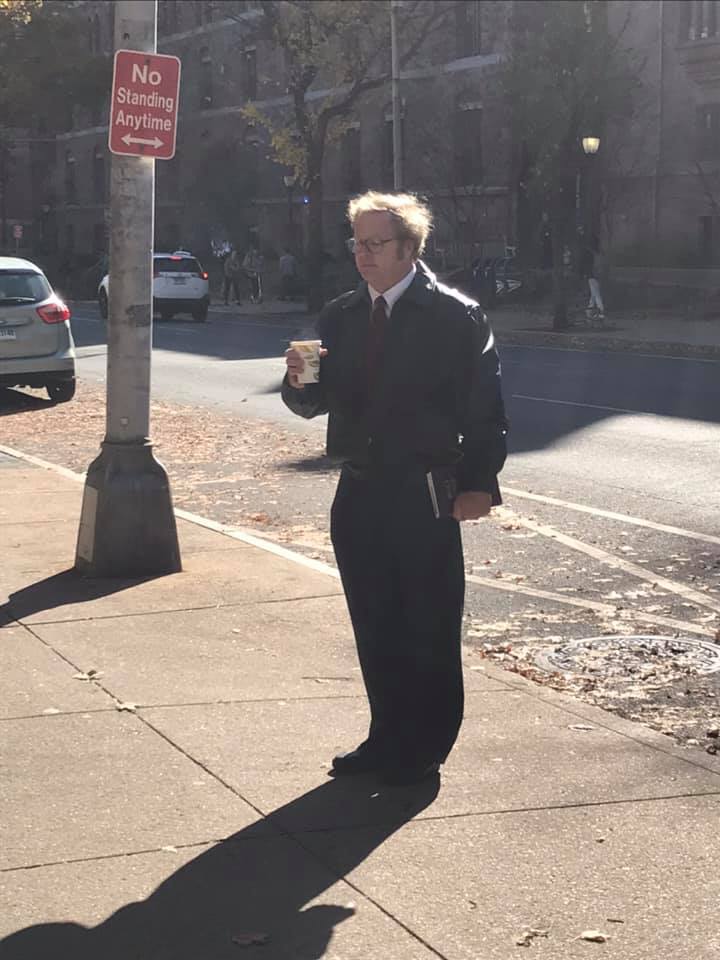
Moses Goren
A confrontation between student activists and a street preacher yelling offensive slurs last week tested whether Yale’s campus truly protects all speech — even homophobic, Islamophobic and racist language hurled toward its students.
The University sided with the preacher’s right to express himself, while Yale Police officers monitored the scene to prevent an aggressive face-off. Meanwhile, student activists criticized what they saw as the Yale Police Department’s passive response to the preacher’s hate speech.
On Thursday and Friday afternoon, the man — who identified himself as “Brother Stephen,” according to Hannah Sachs DIV ’20 — stood on the corner of Elm and High streets and shouted derogatory statements at Yale students and New Haven high schoolers. For hours, the preacher yelled comments accusing Muslims of “[putting] women into slavery” and “the Jews [of killing] Jesus.”
A post on the popular Facebook group Overheard at Yale first called attention to the incident around noon on Friday, when Moses Goren ’22 posted a photo of the preacher holding a Bible and a cup of coffee. On Friday afternoon, around 20 students organized a protest to drown his comments out, blasting music from speakers and chanting “Gay is good.”
“The individual in question was on the sidewalk in the area of Elm and High Streets and exercising his right to free speech,” University spokesperson Karen Peart said, in response to examples of the preacher’s slurs provided by the News.
But in his Overheard at Yale post, Goren said he observed “a white supremacist waving a bible … and a white YPD officer walking up to him, handing him a cup of coffee as a ‘peace offering,’ and patting him on the back.” As of late Monday evening, the post garnered 422 reactions, 106 comments and four shares.
Peart told the News that the University has no knowledge of Yale Police officers engaging in such an activity and added that the YPD “takes very seriously its obligation to protect the constitutional rights of others.”
Frustrations toward YPD’s treatment of the preacher’s tirade come amid heated debates about the extent to which free speech should be protected on college campuses. In an interview with the News in September, University President Peter Salovey emphasized the importance of separating “offensive from discriminatory speech.” Fostering an environment where students and faculty members feel comfortable airing controversial opinions is different from allowing “personal ad hominem attacks,” Salovey said.
But according to students, the preacher’s diatribe was closer to a malicious attack, rather than a reasoned disagreement. Sachs said she was walking from her job at the Yale University Art Gallery on Thursday afternoon when she heard the man tell students that they are going to hell.
According to Sachs, the man then began “[gushing] vitriol” about Native American students. He also claimed that the University “hates Jesus” because “Jesus is opposed to lesbianism,” Sachs said.
“I myself am a queer woman,” Sachs wrote in an email to the News. “I also love Jesus, and I’m studying at Yale Divinity School with the hope of being ordained as a pastor.”
Ashley Anthony ’22 said she was walking by Trumbull College on Friday afternoon when the preacher began yelling at her and said that “bad, bad things” are happening in India because Indians aren’t Christian. Although Anthony identifies as South Asian, her family has lived in Guyana for as long as she can remember, she said.
Sachs reported the preacher to the YPD on Thursday for hate speech and harassment and was informed that officers were en route, she said. She added that she saw one officer at the scene who was sitting in his patrol car. Like Goren, Sachs also said she spotted an officer offering the man a cup of coffee. The officers on Friday were “chatting jovially [and] seemingly uninterested” in the man’s verbal harassment of passing students, Sachs added.
She argued that “there is a massive difference” between protecting free speech and supporting hate speech. The police officers’ actions showed no regard for the physical and emotional safety of those impacted by hate speech, Sachs noted.
“It fits into a narrative of active antagonism through clear refusal to take action for all people of color, which impacts Yale students as well as New Haveners,” Nash Keyes ’21, who attended the Friday protest, said in an interview with the News.
The C. Vann Woodward report, which outlines Yale’s policies on free speech, was issued by Yale in 1974.
Olivia Tucker | olivia.tucker@yale.edu







